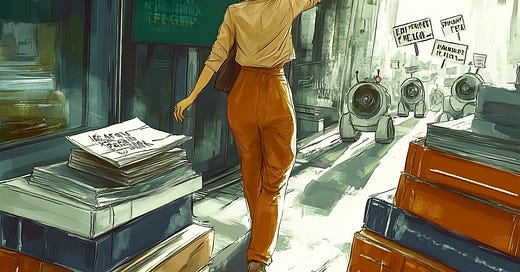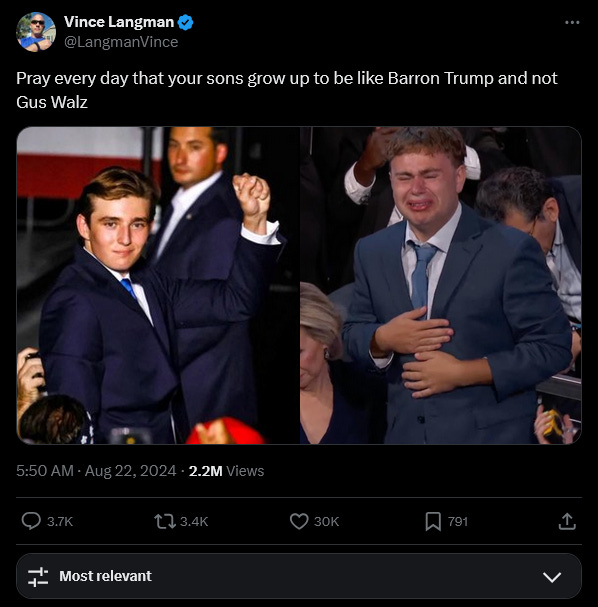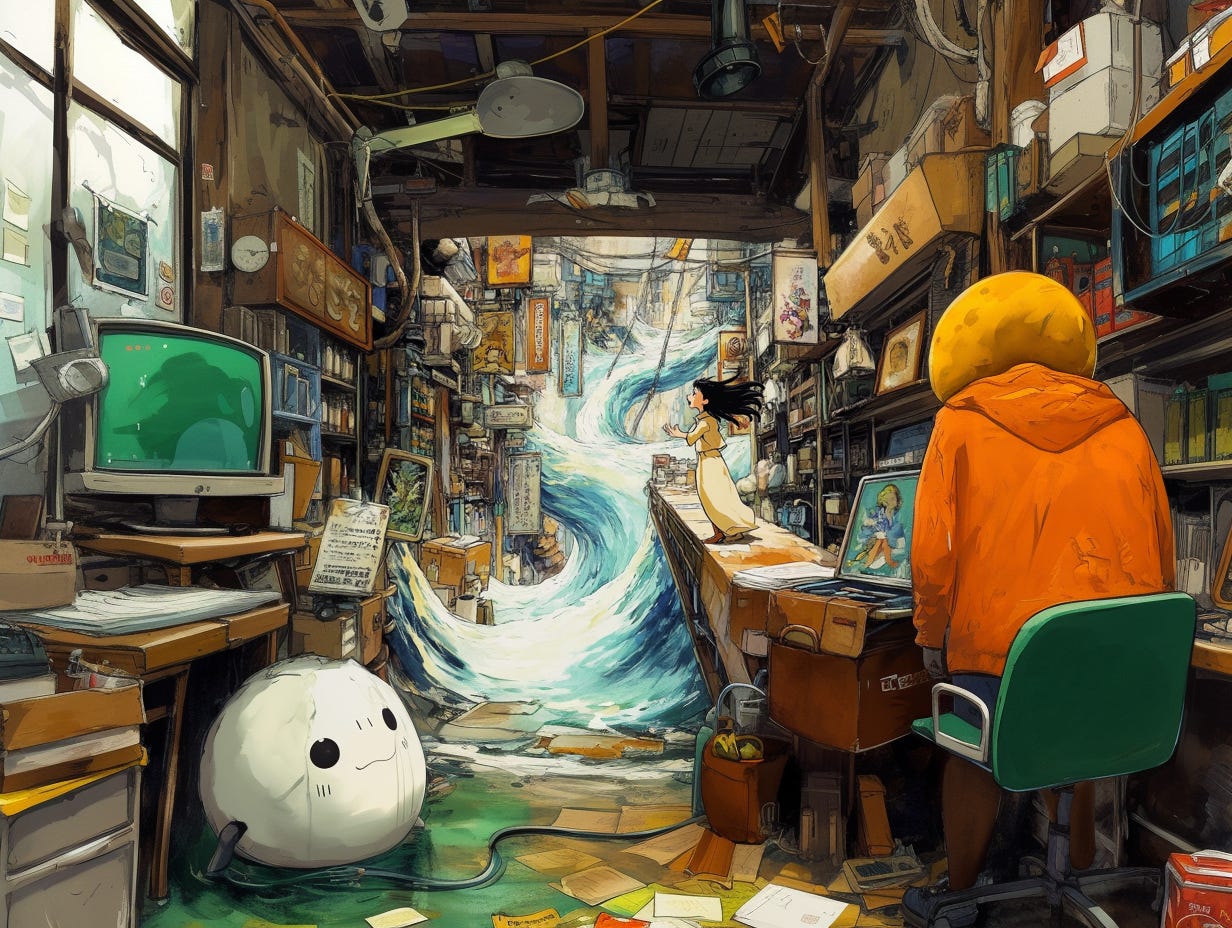As some of you know, the Democratic National Convention in Chicago was Kamala Harris' last stop on the road to the Emerald City. It was the second time a convention in Chicago took place after a sitting president stepped down from the nomination. On the previous occasion in 1968, Vietnam war protesters battled with police on the streets of the Windy City. Nixon rode that wave to the White House. Some of were thinking of riots and revolution this time as well. But 24 ain't 68. Instead, we got Obama talking about the size of Trump's penis:
and Tim Walz's son doing him a solid:
Unsurprisingly, in the America of 2024, a son bursting into tears at his dad's achievements leads to:
Beta is the new Alpha…
Cultural issues have steadily grown in importance over the last 40. I mean, if you go back to Reagan versus Carter, or even much more recently, Bush versus Gore, the big differences were over who to tax, the relative importance of corporations, free markets versus regulations and so on. The kind of thing that affect the material economy.
And the lines were relatively clear.
Democrats were for regulation, for bigger government, for more taxes, and Republicans were for smaller government, lower taxes on the rich, and of course, less regulation. And this division still continues. But the cultural issues have become more and more important. I'm not saying that the previous era Republican and Democratic parties didn't play upon important cultural themes.
We know for a fact that both race and gender have played a role in politics since the 60s. The Southern Democrats became Republican as the Democratic Party became the party of African Americans. Abortion and women’s right to choose divides the two parties. So this has been going on for a while. But today, we are in constant battle over a range of cultural issues and national coverage of minor incidents on campus. Why is testimony by university presidents national TV?
In fact, issues that strike me as being essentially about the material economy have increasingly become culture coded.
I'm thinking of climate change in particular. You would think that it should be about the merits of putting stuff into the atmosphere. Some of you might think, hey, I get rich by putting stuff into the atmosphere and I want to keep doing so and getting richer. And someone else might say, if we keep putting stuff into the atmosphere, at some point we'll all die, so let's stop doing that. But in practice, that's not how it works out. People's belief in the importance of addressing climate change seems to be much more about which cultural coalition you belong to than any adherence to the truth.
Alternative facts are a thing.
In fact, I might go so far as to say that politics is now the primary site of cultural production. If you think about cultural preferences from the 80s,90s or even the 00s, you know, the TV channels you watch or the music you liked, with only a few channels and music labels being dominated by big names, everybody gravitated to the same preferences or at least a relatively small set of preferences.
But today, cultural consumption is immensely fragmented. I mean, think about how I watch Netflix. Forget whether I prefer CNBC to ABC or to Fox News, just take my consumption of Netflix. What I watch on Netflix is almost certainly different from my next-door neighbor. And because of algorithmic curation, what I watch conditions what’s recommended to me by Netflix which makes me diverge even more from my next-door neighbor. The media consumption economy is going in the direction of the tribal niche. In contrast, politics is getting more and more nationalized. Local elections for school body supervisors are about Trump versus Harris. Politics today has the same centripetal quality that the three big TV networks used to have. It's the one thing that everybody orients towards.
Fine, whatever, but what does this have to do with political intelligence? It’s the algorithm. The algorithmic curation that boxes us into ever smaller niches when it comes to media consumption also biases us toward highly centralized forms of political culture. And one explanation of the increasing importance of cultural issues in politics is that politics is a centripetal force in cultural production while media is a centrifugal force.
This is only going to get worse as YouTube gets replaced by TikTok, we are subjected to even faster and fleeting media streams with influencers competing for our attention, but our loyalty is to the drip, not the drop. The platform that remains dominant as influencers come and go. YouTube is not NBC and TikTok is not even YouTube. Meanwhile, in the political arena, it's Trump, Trump, Trump, Trump, Trump, or Harris, Harris, Harris, Harris, Harris. There's a kind of positive feedback loop that makes the prominent politician a bigger cultural presence in our lives.
In short: culture’s importance in politics is downstream from the increase in importance of the attention economy. And not just because Joe Politician has to dial our cultural differences to get elected, but because the attention economy is literally rewiring our brains and changing our calculus of interests. It's a short step from 'to what should I pay attention' to 'what's worth paying attention to in the first place.'Which is why you're seeing some strange combinations emerging - anti-vaxxers shading into climate denial shading into ‘take the vote away from cat ladies.’ I don’t get it, but I am not the right audience.
I believe 'attention' is the right generalization of a concept that pervades our understanding of politics and economics: interest. There’s even an etymological connection. Paying attention to something is clearly related to that something capturing our interest. The relationships doesn’t stop with the lexicon. We are all used to self-interest and class interests and national interest rolling off our tongues.
Passé.
Repeat after me: self-attention, class-attention, national-attention....







It's interesting how political leaders today are also hyper-aware of cultural machines, making them focus on being sensational rather than competent. Thinking of JFK and Nixon's first televised debate, I doubt if that mode of respectful conversation will ever happen :/
great to read this peace. the way, we understanding climate change does catch the problem. You have made a great point, People's belief in the importance of addressing climate change seems to be much more about which cultural coalition you belong to than any adherence to the truth. Another interesting thing is we have only two political choices and force to pick one, the election itself is not democracy, when people get power to design choices there is possibility of democracy.